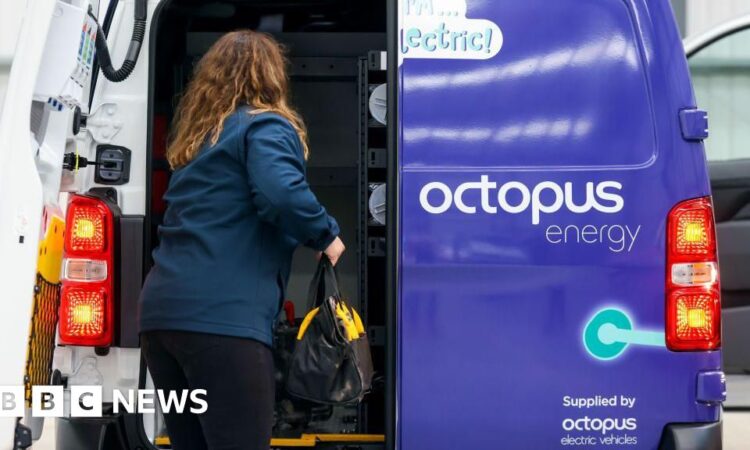
Image source, Getty Images
- Author, Lora Jones
- Role, Business Reporter, BBC News
Octopus Energy will pay nearly £3bn to the government as part of a pledge to return the taxpayers’ funds it received for rescuing Bulb, its collapsed competitor.
It means the Treasury will recoup almost all the cost of temporarily nationalising Bulb back in 2021.
Past forecasts had suggested that it could have been the government’s biggest bailout since the financial crisis. However, lower wholesale energy costs have seen the expected final bill slashed.
Octopus has already begun paying the sum but expects this to be completed in September, according to the Financial Times, in a boost to whoever wins the general election in two weeks’ time.
Politicians had raised concerns that extra costs could be added to customers’ bills when millions have been struggling.
Bulb was among the dozens of smaller energy suppliers that collapsed several years ago following a spike in wholesale gas prices, partly caused by Covid restrictions ending and exacerbated by the war in Ukraine.
Image source, Getty Images
Bulb had 1.5 million UK customers when it went bust.
It was placed into a so-called Special Administration Regime (SAR), where it was run by the government via Ofgem, the energy watchdog, for less than a year as it struggled to find a buyer.
When Octopus Energy stepped in to take over and add Bulb’s customers to its own, it struck a deal with the government which meant that it would help cover the costs of energy for the affected households to ensure supplies were not disrupted.
The energy was bought by the government and, based on wholesale prices, cost £1.63bn.
Under the deal, it was agreed that Octopus Energy would repay the government in line with the level set by the energy price cap, which is decided by Ofgem.
As wholesale gas prices have continued to fall, where Octopus’s agreed repayment price has remained the same, the government stands to not only recover the money spent, but make a profit of £1.28bn from the deal.
“This outcome is a great result for taxpayers,” said Greg Jackson, the founder and chief executive of Octopus Energy.
“Octopus worked hard in the darkest depths of the energy crisis to create a fair deal, meaning that although Bulb went bust with billions of liabilities, it has cost the government almost nothing.”
Roughly £6.1m of other costs that the government has to pay in relation to the SAR remain outstanding, down from the £19.6m forecast as recently as February, according to a letter sent to the Public Accounts Committee by the permanent secretary for energy security last month.
It means the government will recover more than 99% of the money lent to Octopus Energy.
There are still a number of “uncertainties” to work through though, the letter said, so the final numbers may still be subject to some change.
It has been reported that the SAR model may well be considered if Thames Water were to collapse under its debts.
The Treasury, Department for Environment and regulator Ofwat have been “wargaming” a situation that would see financial consultants run the company on the government’s behalf.






